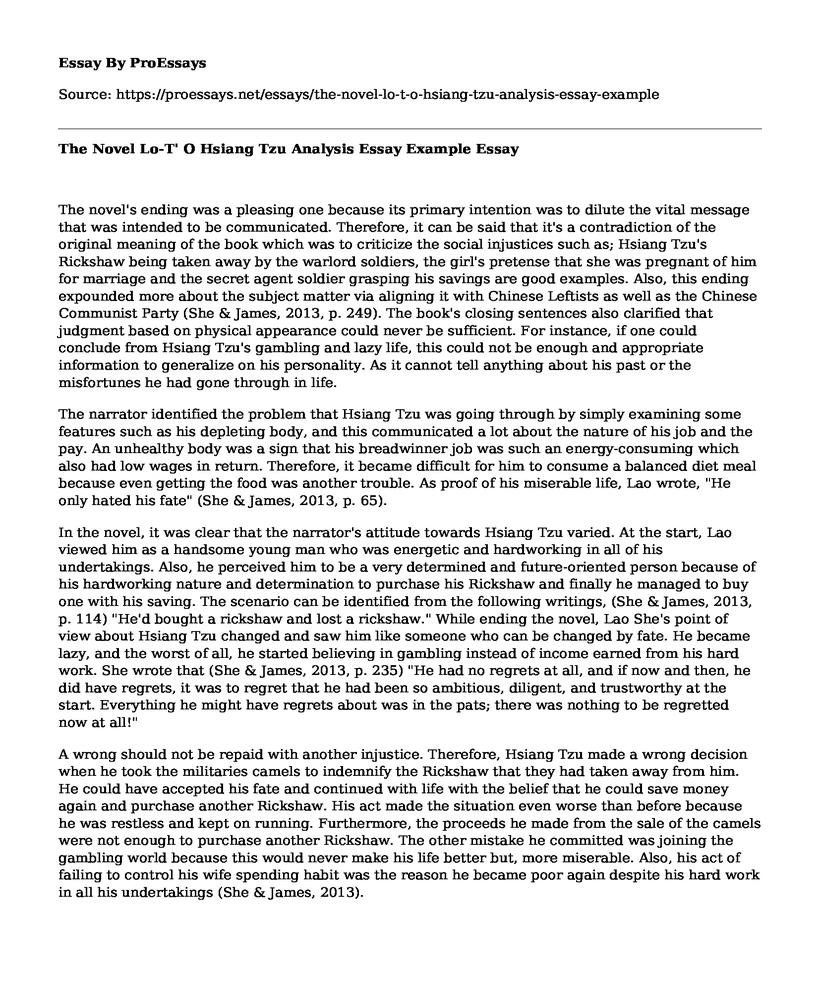The novel's ending was a pleasing one because its primary intention was to dilute the vital message that was intended to be communicated. Therefore, it can be said that it's a contradiction of the original meaning of the book which was to criticize the social injustices such as; Hsiang Tzu's Rickshaw being taken away by the warlord soldiers, the girl's pretense that she was pregnant of him for marriage and the secret agent soldier grasping his savings are good examples. Also, this ending expounded more about the subject matter via aligning it with Chinese Leftists as well as the Chinese Communist Party (She & James, 2013, p. 249). The book's closing sentences also clarified that judgment based on physical appearance could never be sufficient. For instance, if one could conclude from Hsiang Tzu's gambling and lazy life, this could not be enough and appropriate information to generalize on his personality. As it cannot tell anything about his past or the misfortunes he had gone through in life.
The narrator identified the problem that Hsiang Tzu was going through by simply examining some features such as his depleting body, and this communicated a lot about the nature of his job and the pay. An unhealthy body was a sign that his breadwinner job was such an energy-consuming which also had low wages in return. Therefore, it became difficult for him to consume a balanced diet meal because even getting the food was another trouble. As proof of his miserable life, Lao wrote, "He only hated his fate" (She & James, 2013, p. 65).
In the novel, it was clear that the narrator's attitude towards Hsiang Tzu varied. At the start, Lao viewed him as a handsome young man who was energetic and hardworking in all of his undertakings. Also, he perceived him to be a very determined and future-oriented person because of his hardworking nature and determination to purchase his Rickshaw and finally he managed to buy one with his saving. The scenario can be identified from the following writings, (She & James, 2013, p. 114) "He'd bought a rickshaw and lost a rickshaw." While ending the novel, Lao She's point of view about Hsiang Tzu changed and saw him like someone who can be changed by fate. He became lazy, and the worst of all, he started believing in gambling instead of income earned from his hard work. She wrote that (She & James, 2013, p. 235) "He had no regrets at all, and if now and then, he did have regrets, it was to regret that he had been so ambitious, diligent, and trustworthy at the start. Everything he might have regrets about was in the pats; there was nothing to be regretted now at all!"
A wrong should not be repaid with another injustice. Therefore, Hsiang Tzu made a wrong decision when he took the militaries camels to indemnify the Rickshaw that they had taken away from him. He could have accepted his fate and continued with life with the belief that he could save money again and purchase another Rickshaw. His act made the situation even worse than before because he was restless and kept on running. Furthermore, the proceeds he made from the sale of the camels were not enough to purchase another Rickshaw. The other mistake he committed was joining the gambling world because this would never make his life better but, more miserable. Also, his act of failing to control his wife spending habit was the reason he became poor again despite his hard work in all his undertakings (She & James, 2013).
Conclusion
In conclusion, it was clear that Hsiang Tzu's effort to make his life better yielded no fruit and each path he took always led to another problem (She & James, 2013). However, quitting was not the solution because a problem cannot be solved running away from it thus, he could have faced reality and trust that tomorrow could have been better.
References
She, L., & James, J. M. (2013). Rickshaw: The Novel Lo-t'o hsiang tzu.
Cite this page
The Novel Lo-T' O Hsiang Tzu Analysis Essay Example. (2022, Nov 20). Retrieved from https://proessays.net/essays/the-novel-lo-t-o-hsiang-tzu-analysis-essay-example
If you are the original author of this essay and no longer wish to have it published on the ProEssays website, please click below to request its removal:
- Essay Example on The Role of Bottom in Shakespeare's A Midsummer Night's Dream
- The Yellow Wallpaper: Suppression of Women in the 19th Century and Escape
- Owen's Use of Imagery Essay Example
- Essay Example on Romeo and Juliet: Love Is a Chaotic Force of Nature
- Reflection on the Movie 12 Angry Men
- Eileen Chang: Iconic Writer and Hall of Fame Icon - Essay Sample
- Essay on Tayeb Salih's A Handful of Tales: A Grandfather's Impact on a Young Boy







